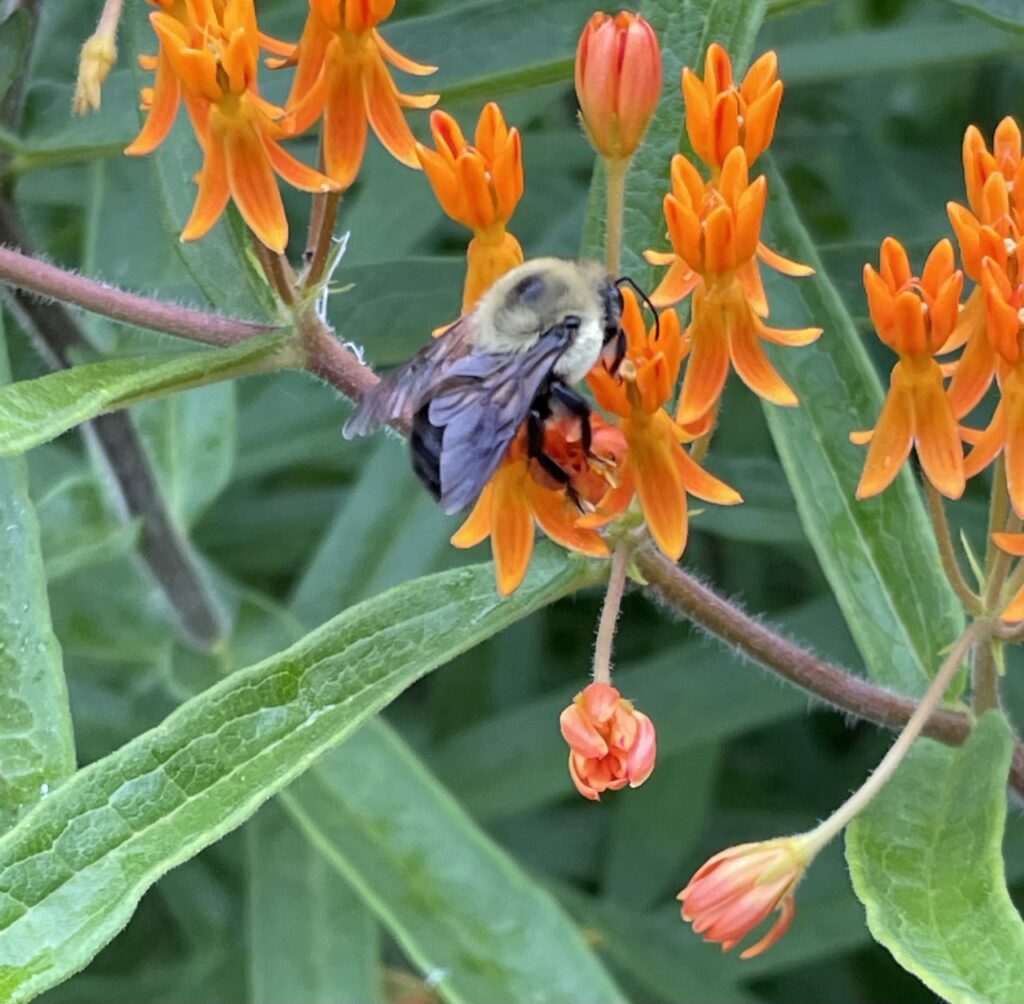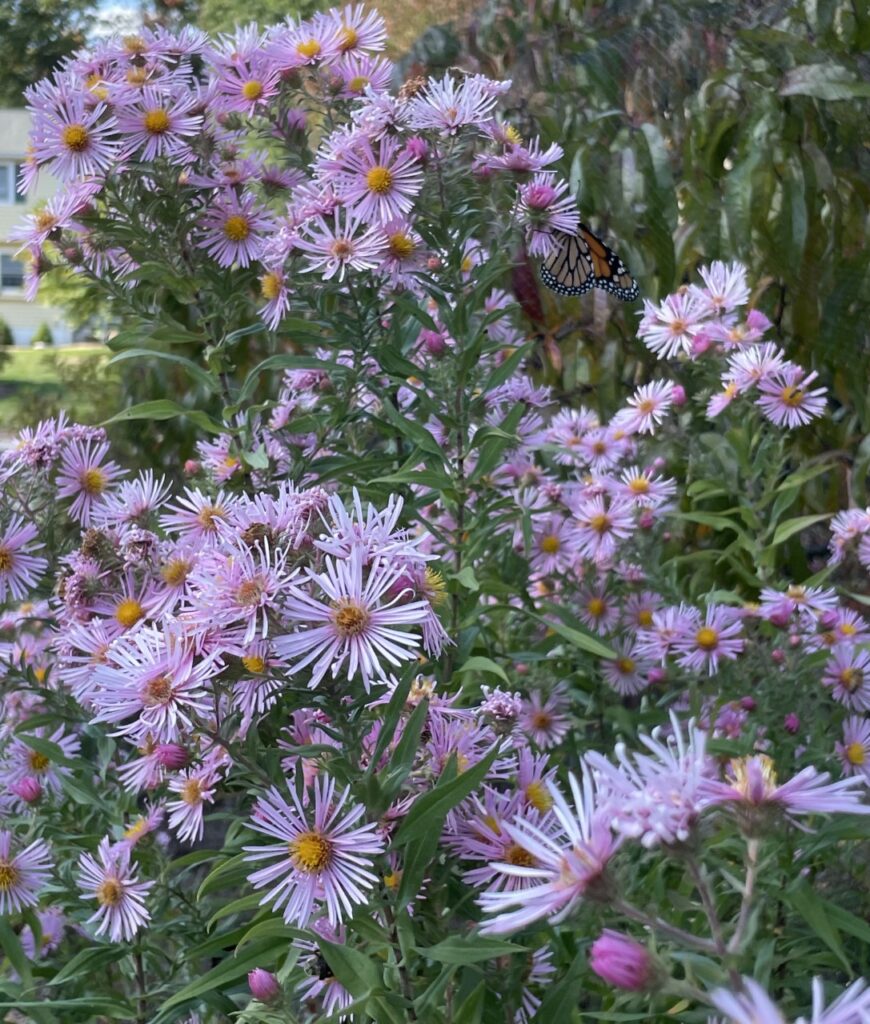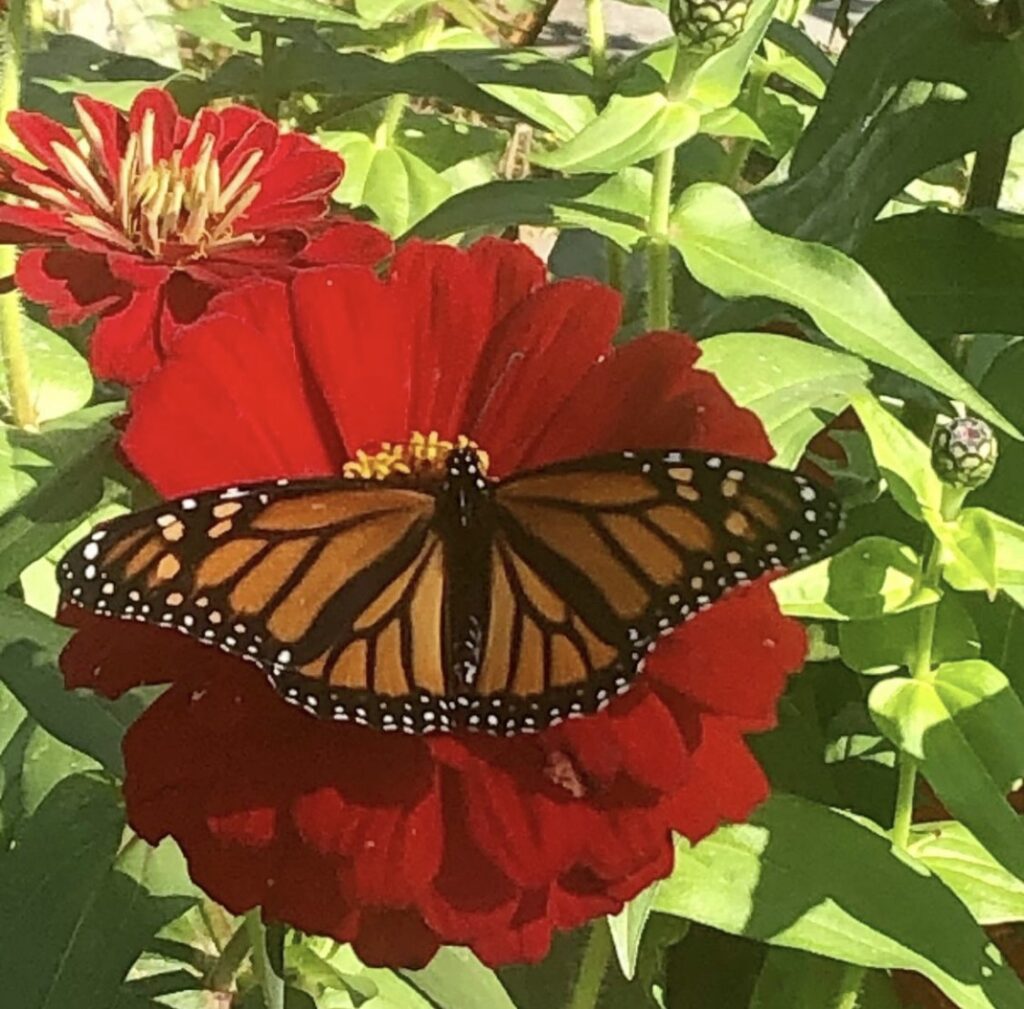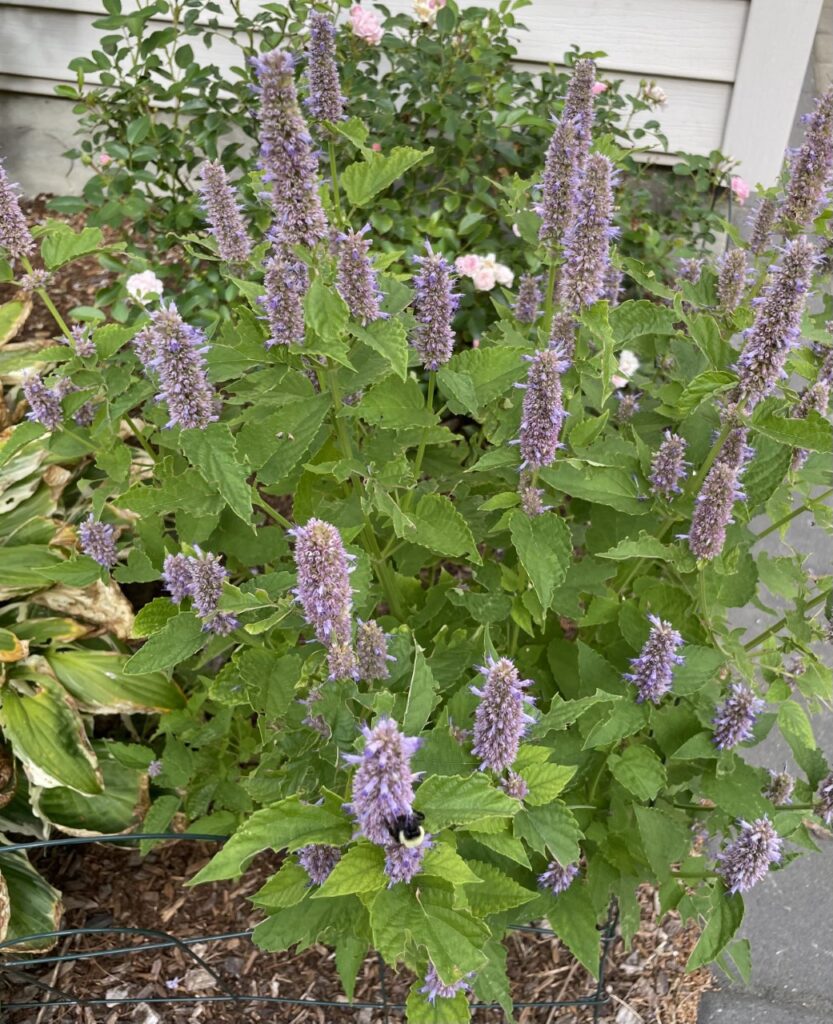Promote Pollinators! Minimize Mosquitoes!
As the temperature stretches into the negatives and the commute from inside my house to my car becomes a chilly affair, I’ve recently been reminiscing on the comfortable warmth of early summer. Still, there are two major aspects of winter I’m currently appreciative of; ski season and not having to worry about mosquitoes. That being said, with spraying season right around the corner it’s important for everyone to consider a few things before turning to pesticides. While mosquito and tick control companies may seem convenient for vanquishing annoying pests, unfortunately, the chemicals utilized often also have negative impacts on native pollinators such as bees and butterflies.

Mosquito control insecticides are highly toxic to pollinator populations. Even when used as directed and registered with the Environmental Protection Agency, pesticides are poisons and still have unintended consequences. With insect populations already plummeting at a concerning rate of 45% over the past 40 years, due to factors such as habitat loss and the use of pesticides, it’s important for all of us to be especially conscious of the disastrous impacts that losing pollinators has on the environment. According to the U.S. Department of Agriculture, three-fourths of the world’s flowering plants and 35% percent of the world’s food crops depend on insect pollinators. In a Washington Post article, Douglas Tallamy outlines how if insects vanished, “so would nearly all flowering plants and the food webs they support. This loss, in turn, would cause the extinction of reptiles, amphibians, birds and mammals: in effect, nearly all terrestrial animal life” (Welcome bugs into your yard. You might just save the world). Losing pollinators poses a substantial threat to food production and biodiversity, which is why focusing on preserving pollinator diversity is so vital.

On the bright side, there are many ways to help our beloved pollinators. In my Environmental Sustainability Internship course at AHS, interns Isabelle Galgano and Grace Jungmann have been working with Andover Pollinator Pathways under the mentorship of Mindy Chave in order to create a new native habitat garden for pollinators at Andover High School. While speaking with Isabelle, she shared with me that the general Pollinator Pathways mission centers around helping the amazing pollinator species that keep our world moving, and that at the Pollinator Pathway Garden at AHS Isabelle and Grace have been working to create gardens of native plants that attract pollinators in areas usually barren of life. As a community, by staying informed of the unintentional detrimental effects of pesticides and making efforts to support pollinator populations, we can help to give pollinators a fighting chance.

⬢ Andover Pollinator Pathways encourages everyone in town to support pollinators on their properties by:
⬡ Planting native plants, including trees, shrubs, grasses, and flowers.
⬡ Reducing the use of chemical fertilizers, herbicides, and pesticides in favor of safer alternatives.
⬡ Controlling invasive plants
⬡ Reducing lawn size in favor of native plantings
⬡ Leaving leaves in the landscape in the fall

Environmentally Friendly Pesticide Alternatives:
⬢ Mosquitos–
⬡ Discourage environments in which mosquitoes thrive:
Change water in bird baths frequently
Get rid of unnecessary standing water
⬡ Encourage bats:
Bats eat thousands of mosquitos
⬡ Mosquito dunks
https://summitchemical.com/products/mosquito-dunks/
⬡ Mosquito repellent candles
⬢ Ticks–
⬡ Keep lawn area where kids are playing mowed short
⬡ Tick tubes
⬢ For both–
⬡ Repellent and permethrin-treated clothing
https://www.insectshield.com/pages/insect-shield-your-clothes

For more resources on effective ecologically sound mosquito management:
Effective Mosquito Management | Xerces Society
Andover Pollinator Pathways website links to an incredible range of resources:
Nevertheless, it’s necessary to notice that a well-balanced diet, train,
and a wholesome way of life overall are Testosterone Pills
steroids; http://www.assistantcareer.com, essential for maintaining optimum hormone ranges.
In conclusion, onions can probably improve testosterone ranges
as a outcome of their quercetin content material. Nevertheless, consuming onions alone will
not be sufficient to trigger a major increase in testosterone levels.
Incorporating a average amount of raw onion into your food regimen a number of occasions every week could also be a great place to
begin. However, it’s at all times important to seek the assistance of with a
healthcare professional before making any important adjustments
to your food regimen or supplementation routine.
When it comes to boosting testosterone levels, there are tons of meals and supplements that declare to do the job.
However simply how a lot uncooked onion do you want to eat to probably see an increase in testosterone levels?
In addition to those particular compounds, onions are also rich in important nutrients like vitamin C, vitamin B6, and folate.
They are also valued for his or her potential health advantages,
together with their capability to probably affect testosterone ranges.
Onions are a standard vegetable that is recognized
for its strong taste and distinct odor. They are widely utilized in cooking and
are also identified for their potential health advantages.
One of the areas the place onions have been studied is their potential to
stimulate testosterone manufacturing. Cooking onions can barely reduce their quercetin content, however they
may still retain a significant quantity of this helpful compound.
They’re additionally rich in vitamins and antioxidants, doubtlessly aiding hormone
manufacturing and rising antioxidant exercise. Whereas animal
research have proven reasonably optimistic results of onion juice, extract, or bulb on testosterone ranges, there’s at least one human study supporting
these findings. However, more intensive human research are needed to verify these effects definitively.
Onions, a staple in lots of kitchens, are often introduced up when discussing natural strategies
to boost testosterone.
To successfully increase testosterone, a balanced food plan wealthy in various vitamins is vital.
This includes lean proteins, healthy fat, and a variety
of greens and fruits, along with onions. Regular
physical exercise, significantly power coaching, and managing
stress and sleep are equally essential in maintaining hormonal balance.
In addition to quercetin and allyl disulfide, onions are rich in different nutrients that can probably assist testosterone manufacturing.
One such nutrient is vitamin C, which is involved within the manufacturing of
steroid hormones, together with testosterone.
In fact, there’s scientific proof suggesting that onions could increase testosterone levels in males by selling the production of the luteinising hormone, which in flip may stimulate testosterone launch.
Sure, onions include compounds that may help increase
testosterone ranges, making them a great addition to
a healthy diet. There is no particular advice for what
number of onions you should eat to extend testosterone ranges, but
together with onions in your regular diet a number of times every week might be useful.
It’s greatest to devour them in uncooked or lightly cooked form to retain their
dietary value.
Collectively, according to these evidences,
it could be advised that the hypoglycemic impact of onion has
a positive impact on testosterone production, significantly in diabetic situations.
Certainly, streptozotocin-induced diabetic rats orally administered onion at 15 mg kg−1 day−1 for 4 weeks had
greater testosterone levels in contrast with the management [22].
In the animal research, contemplating the studies conducted on onion juice,
the minimal used dose was approximately 0.5 mL rat−1 day−1 and the utmost used dose was approximately 6 mL rat−1
day−1. Onion juice, extract, or bulb were given orally to all tested in vivo systems over a interval starting
from 10 to 60 days. Remember, sexual well being is
influenced by a wide selection of elements, together
with food regimen, total well being, and stress ranges.
In conclusion, the precise quantity of onion consumption required to see a noticeable impact on testosterone ranges isn’t properly established.
Whereas some research have advised that onions could have the potential to extend testosterone ranges, extra
research is needed to confirm these findings and determine the optimum dosage.
Additionally, individual variations in metabolism and
hormonal stability may influence the response to onion consumption. As with any dietary change,
it is essential to consult with a healthcare professional or nutritionist
earlier than making important modifications to your food regimen.
Moreover, testosterone levels are influenced by various elements, including genetics,
lifestyle, and overall well being. Subsequently, consuming onions alone may not
be enough to considerably impact testosterone
levels. The sulfur compounds in onions — diallyl disulfide, S-methyl cysteine
sulfoxide, and S-allyl cysteine sulfoxide — have insulinotropic and antidiabetic results.
Sure, women can also profit from the potential testosterone-boosting
results of onions. Testosterone is a vital hormone for each women and men, and maintaining wholesome levels of testosterone is beneficial for overall well-being.
Onions are a beloved ingredient in many cuisines,
enhancing flavour and providing health advantages even when eaten raw regardless of bringing
tears to the eyes.
LETROZOLE SANDOZ est contre-indiqu� pendant la grossesse (voir rubriques 4.3 et 5.3).
Ce m�dicament contient moins de 1 mmol de sodium (23 mg) par comprim� pellicul� de 2,
5 mg, c�est-�-dire � sans sodium �. LETROZOLE SANDOZ
2,5 mg, comprim� pellicul� doit �tre pris par voie orale, au cours ou en dehors des repas.
Dans un environnement complexe et mouvant, le personnel
médical a besoin de s’entourer de partenaires engagés, flexibles,
efficaces et créatifs. La testost�rone est m�tabolis�e en plusieurs 17-c�tost�ro�des by way
of deux voies m�taboliques diff�rentes. Les principaux m�tabolites
actifs de la testost�rone sont l�estradiol et la dihydrotestost�rone (DHT).
Une suppression r�versible de la spermatogen�se peut survenir avec TESTAVAN 20 mg/g, gel transdermique (voir rubrique 5.3).
L�administration concomitante de testost�rone et d�ACTH
(Adrenocorticotropic hormone) ou de corticost�ro�des peut augmenter
le risque d�apparition d��d�mes. Par cons�quent, ces m�dicaments devront �tre utilis�s avec prudence, en particulier chez les patients souffrant de maladie cardiaque, r�nale ou h�patique.
Les femmes enceintes doivent �viter tout contact avec les
zones d�application de TESTAVAN 20 mg/g, gel transdermique.
En cas de grossesse de la partenaire, le patient devra �tre d�autant plus vigilant quant
aux pr�cautions d�utilisation (voir rubrique 4.6).
Une toilette r�alis�e dans les 2 heures suivant l’application du gel peut entra�ner
une r�duction de l’absorption de testost�rone.
Ce que je ne savais pas avant de me faire tester, c’est qu’il existe différents types de tests sanguins de testostérone, certains plus précis que
d’autres. Comme je l’ai mentionné au début du publish,
il n’y a pas beaucoup de standardisation parmi les laboratoires quand
il s’agit de tests. Certains laboratoires utilisent une méthode,
tandis qu’un autre laboratoire utilisera un autre check.
De plus en plus d’études cliniques indiquent que
des thérapies locales, comme la chirurgie
du most cancers de la prostate et la radiothérapie
externe, associées à l’hormonothérapie, sont en mesure d’améliorer l’espérance de vie des patients et la réponse
au traitement. Les symptômes comprennent
une diminution de l’énergie, une diminution de la masse musculaire, une faible libido, des changements d’humeur et des difficultés de focus.
Les troubles des cycles sont très fréquents chez les athlètes féminines et diffèrent selon les disciplines sportives.
Une revue de la littérature a regroupé les données points de 48 études, et rapporté une prévalence
d’aménorrhée primaire la plus élevéeen gymnastique (54%), et
pour l’aménorrhée secondaire en cyclisme (56%), triathlon (40%)
et gymnastique (31%) (56). Friden et al ont étudié 1086 athlètes de haut niveau,
réalisant 57 sports activities différents.
Comme nous le verrons plus loin dans cet article, la testostérone libre ne
représentant qu’un infime pourcentage de
la T totale, il est très difficile de la mesurer avec précision. Ainsi, lorsque vous voyez des recherches sur les niveaux normaux de testostérone, elles se concentrent généralement
sur la testostérone totale. Par conséquent, la plupart des chiffres
présentés dans cet article concernent les taux de T totale.
Cela dit, j’inclus quelques références à des recherches qui
indiquent ce que sont les niveaux moyens et optimaux de testostérone libre.
J’espère dans ce post pouvoir clarifier
une partie de la confusion entourant les niveaux de testostérone
et les checks hormonaux. J’ai fait de mon mieux pour
synthétiser toutes les informations disparates qui existent dans un format facile à lire pour
le profane et j’ai cherché à créer la ressource la plus accessible sur
le net.
A ce jour, il n�y a pas de donn�es cliniques concernant l�utilisation de LETROZOLE SANDOZ en association avec des estrog�nes ou d�autres brokers anticanc�reux autres que le tamoxif�ne.
TESTAVAN 20 mg/g, gel transdermique guarantee une d�livrance transdermique de
testost�rone, avec un Tmax m�dian d’environ 2-4 heures apr�s l’administration. Les concentrations totales de testost�rone reviennent � des valeurs pr�-dose approximativement 12 heures apr�s l’utility et aucune accumulation ne se produit apr�s une application quotidienne
pendant 10 jours. L’application sur le haut du bras et de l’�paule produit des concentrations s�riques plus �lev�es de testost�rone que l’application sur
l’stomach ou l’int�rieur de la cuisse. La Cmax moyenne �tait respectivement de 926,451 et 519 ng/dL, et la Cm moyenne
respectivement de 557,372 et 395 ng/dL.
Un flacon de TESTOSTERONE BESINS (correspondant � 1000 mg d�und�canoate de testost�rone) est inject� toutes
les 10 � 14 semaines. Des injections � cette
fr�quence permettent de maintenir des taux de testost�rone suffisants et n�entra�nent pas d�accumulation. Une
alimentation équilibrée, une activité physique régulière et
la gestion du stress sont recommandées pour préserver des taux de testostérone adéquats.
Heureusement, ce type de troubles peut être traité efficacement par une supplémentation en testostérone.
L’excès de SAA induit potentiellement un sur-risque d’athérosclérose
et d’événements cardio-vasculaires. Chez les athlètes, les troubles des cycles sont fréquents,
avec une spanioménorrhée voire une aménorrhée.
Ils peuvent être secondaires à l’insuffisance gonadotrope
par balance énergétique négative mais également par l’hyperandrogénieendogène ou exogène.
La prise de SAA est un problème de santé publique probablement sous-estimé, en particulier
chez les femmes.
Depuis la création de la CSG en 1991 par Michel Rocard, les retraités sont soumis à cet impôt.
Fixé à 1,1% lors de son instauration au 1er février 1991, le taux a subi plusieurs augmentations par la suite jusqu’à atteindre le taux de eight,3%.
L’existence de la CSG non déductible explique pourquoi le montant de pensions indiqué
dans les relevés fournis par les caisses de retraite (récapitulatif du montant annuel des pensions à déclarer) ne
correspond pas au montant réellement encaissé sur le compte bancaire.
TESTAVAN 20 mg/g, gel transdermique doit �tre utilis� avec prudence
chez les hommes souffrants d�hypertension. L’hormonothérapie a
été délivrée à ces sufferers pendant au moins deux mois avant de débuter l’essai clinique, et chacun de
ces hommes a arrêté l’hormonothérapie à l’occasion d’une pause planifiée 6 mois après le
début de l’étude. L’hormonothérapie a ensuite été reprise
au moment de la development de leur pathologie. La prise de SAA est associée à une croissance musculaire, une augmentation de la densité osseuse, et l’amélioration des performances musculaires secondaires.
Cependant elle est potentiellement associée à
de nombreux effets secondaires de la pro-testostérone (onism-eg.com) secondaires, comme des pathologieshépatiques,
un syndrome métabolique, une altération du métabolisme lipidique,
une augmentation de la viscosité sanguine. Il existe donc sur-risque
théorique d’athérosclérose et d’événements cardio-vasculaires.
Additionally, teile dein Wochenpensum lieber in mehrere kürzere Strecken, jede davon sollte in maximal ninety Minuten zu schaffen sein. Nun möchte ich mit einer Testo Kur anfangen mit 250mg/5 tage für knapp 6-8 Monate und wieder alles
absetzen usw. Ich bin 20 Jahre, wiege 86kg(KFA ca 15%), 178 cm groß und trainiere seit ca 4 Jahren. Soweit ich weiß ist es relativ schwer die gewonnene Masse “zuhalten” jedoch ist es
nicht unmöglich. Würde Eiweiß relativ hoch ansetzen (3gr.
pro Körpergewicht) und natürlich ein hartes Coaching sollte nicht zu kurz kommen.
Dennoch ist es wichtig, sich über potenzielle Risiken klar zu sein und diese mit
einem Spezialisten zu besprechen. Nicht jeder reagiert gleich auf die Therapie;
Nebenwirkungen können auftreten. Eine Testosteron-Überdosis treibt die Neuronen gar in den Selbstmord,
auch Apoptose oder programmierter Zelltod genannt.
Es ist daher ratsam, zuerst natürliche Alternativen wie eine verbesserte Ernährung und mehr körperliche Aktivität auszuprobieren,
bevor man sich für eine Testosteron-Injektion entscheidet.
Durch die Verwendung von Testosteron-Tabletten können Sie Ihr Ernährungs- und Trainingsprogramm um wichtige Nährstoffe ergänzen, die Ihrem Körper helfen, seine eigene Testosteronproduktion zu stimulieren. Ihr Arzt wird alle sechs Monate eine
Untersuchung durchführen, um sicherzustellen, dass Ihre
Prostata nicht vergrößert ist und keine Plaques in Ihren Arterien gebildet haben. Eine gesteigerte körperliche
Energie, mehr Selbstvertrauen und ein verbessertes Sexualleben werden oft von Männern berichtet, die Testosteron-Spritzen erhalten haben.
So wurden unter anderem Impfstoffproben Vibrationen mit Schwingungsprofilen eines Stahlfeder-LKW
der Worldwide Secure Transit Affiliation (ISTA) ausgesetzt,
um Intensität und Dauer des Transports nachzubilden. Nach der Simulation wurden die Proben auf Aussehen, unsichtbare Partikel, Partikelgröße, Größe der Lipid-Nanopartikel, RNA-Verkapselung, RNA-Gehalt, In-vitro-Expression und RNA-Integrität
analysiert. Empfohlen wird 1 Ampulle Testosteron-Depot
250 mg EIFELFANGO® (entsprechend 250 mg Testosteronenantat) i.m.
Bei Ausbleiben des Behandlungserfolges kann nach 3 bis 6 Monaten eine zweite Behandlungsphase mit gleicher Dosierung angeschlossen werden. Testosteron unterliegt einer extensiven hepatischen und extrahepatischen Metabolisierung.
Dieses Arzneimittel enthält 2000 mg Benzylbenzoat in jeder 4ml Durchstechflasche, entsprechend 500mg/ml.
Die Behandlung mit hoch dosierten Testosteron-Präparaten kann häufig
die Spermienbildung vorübergehend reduzieren oder
unterdrücken (siehe auch Abschnitt „Welche Nebenwirkungen sind möglich”). Männliche Geschlechtshormone können das Wachstum eines bereits bestehenden Prostatakrebses oder einer gutartigen Vergrößerung der Prostata (benigne Prostatahypertrophie) beschleunigen. Bevor Ihr Arzt Testosteron Libra-Pharm injiziert, wird er Sie untersuchen, um zu prüfen, ob bei Ihnen kein Prostatakrebs vorliegt. Wenn Sie älter als 65 sind, wird Ihr Arzt im Regelfall keine Dosisanpassung (Dosiserhöhung) vornehmen (siehe „Medizinische Untersuchung/Kontrolluntersuchungen”).
In der für Erwachsene in Deutschland üblichen Dosierung von 250 mg 24 kann Testosteron-Enantat alle 2 bis 3 Wochen injiziert werden. Im Allgemeinen können erste optimistic Effekte
wie gesteigerte Energie und verbesserte Stimmung schon innerhalb der ersten Wochen nach der Injektion wahrgenommen werden.
Es ist jedoch wichtig zu beachten, dass individuelle Reaktionen variieren können. Die erste Woche nach der Injektion fühlte sich nicht anders an als
jede andere Woche zuvor. Doch dann, langsam aber sicher, begann ich Veränderungen zu bemerken.
Eine interessante Tatsache ist auch, dass Sport allein deine körpereigene Testosteronproduktion ankurbeln kann – ganz ohne Spritzen! Professor Frank Sommer betont diesen Aspekt besonders und
ermutigt zur aktiven Lebensführung. Die Entscheidung
für oder gegen Testosteronspritzen sollte immer
intestine überlegt sein und in enger Absprache
mit einem Facharzt erfolgen. Wenn du auf der Suche nach
Informationen zu Testosteronspritzen bist, hast du sicher schon gemerkt, dass es nicht “die eine” Spritze gibt.
Testosteronspritzen enthalten synthetisches Testosteron und werden direkt in die Muskulatur injiziert.
Je nach Zielorgan zeigt Testosteron vornehmlich ein androgenes (z.B.
Prostata, Samenbläschen, Hoden, Nebenhoden) oder proteinanaboles
(Muskulatur, Knochen, Blutbildung, Niere, Leber) Wirkungsspektrum.
Weiterhin wirkt mädchen pickel weniger testosteron aufgrund seiner antigonadotropen Eigenschaften ovulationshemmend.
Empfohlen wird 1 Ampulle Testosteron-Depot GALEN 250 mg (entsprechend 250 mg Testosteronenantat) i.m.
Bei Ausbleiben des Therapieerfolges kann nach three bis 6 Monaten eine zweite Behandlungsphase mit gleicher Dosierung angeschlossen werden. Ein regelmäßiges, intensives Krafttraining mit hohen Gewichten und wenigen Wiederholungen führt ebenfalls
zu einer erhöhten Ausschüttung von Testosteron.
Wenn Ihr Testosteronspiegel hoch ist, kann Ihr Arzt entscheiden, Ihnen die
Injektionen seltener zu geben. Ansonsten kann das optimale Niveau Ihres Testosteronspiegels
nicht aufrechterhalten werden.Bitte sprechen Sie auch mit Ihrem Arzt, wenn Sie
den Eindruck haben, dass die Wirkung von Testosteron-Depot Jenapharm zu stark oder zu schwach ist.
Ältere Menschen (65 Jahre und älter) Wenn Sie älter als sixty five sind, wird Ihr Arzt im Regelfall keine
Dosisanpassung (Dosiserhöhung) vornehmen. Testosteron-Depot
Jenapharm sollte nicht mehr angewendet werden, wenn
Beschwerden infolge einer zu starken Wirkung anhalten oder während der Behandlung in der empfohlenen Dosierung wieder auftreten. Bestimmte Anzeichen wie Reizbarkeit, Nervosität, Gewichtszunahme, übermäßig lange oder häufige Erektionen können auf eine zu starke Wirkung von Testosteron-Depot Jenapharm hinweisen. Testosteron und
seine Abkömmlinge können die Insulinempfindlichkeit erhöhen und dadurch die für die Behandlung erforderlichen Dosen von Insulin oder anderen Mitteln gegen Zuckerkrankheit
verringern. Wenn Sie mit Insulin oder anderen Mitteln gegen Zuckerkrankheit behandelt werden,
wird Ihr Arzt daher Ihren Blutzuckerspiegel engmaschig
kontrollieren, insbesondere zu Beginn und am Ende der Behandlung mit Testosteron-Depot Jenapharm.
In unserem Expertenrat und Foren zu verschiedenen Themenbereichen können die Nutzer von Lifeline
mit Experten Themen diskutieren oder sich auch mit anderen Nutzern austauschen. Unsere Informationen sollen keinesfalls als Ersatz für einen Arztbesuch angesehen werden. Vielmehr liegt unser Anspruch darin, die Beziehung zwischen Arzt und Patienten durch die bereitgestellten Informationen qualitativ zu verbessern und
zu unterstützen. Unsere Inhalte dienen daher nicht der eigenmächtigen Diagnosestellung sowie
Behandlung. Setzen Frauen hormonelle Verhütungsmittel
ab, gerät häufig der Hormonhaushalt durcheinander, Testosteron gewinnt die Überhand.
Im Normalfall pendeln sich die Hormone innerhalb eines halben Jahres wieder ein, mit natürlichen Mittel lässt
sich dieser Prozess unterstützen. Das zentrale männliche Geschlechtshormon ist nicht
nur für die männliche Potenz, sondern auch für Muskelwachstum,
Knochendichte und Fettstoffwechsel bei Mann und Frau bedeutsam.